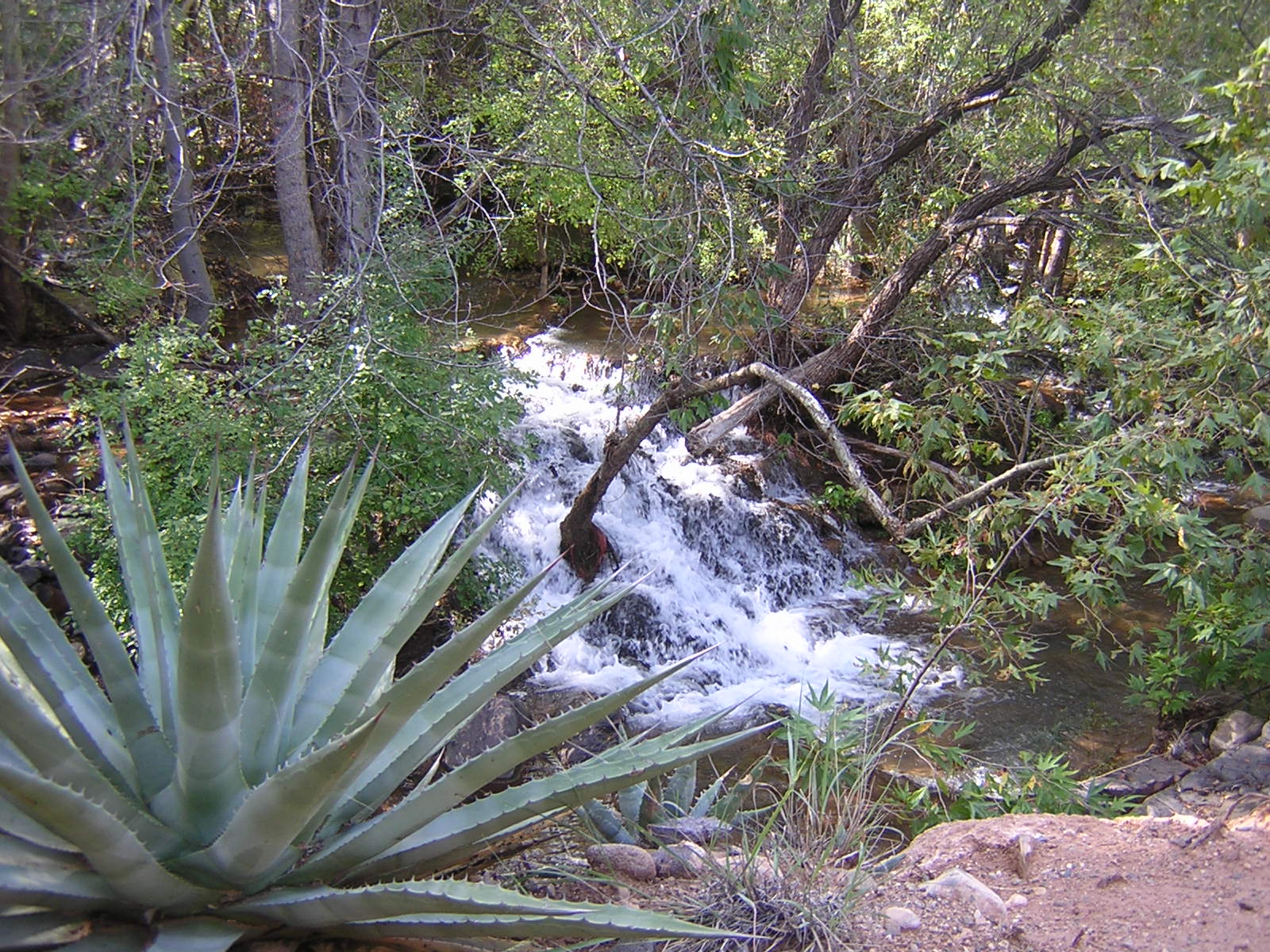Fossil
Creek Watershed
and Riparian Restoration

photo: Ian Reed, U.S.
Forest Service
About Fossil Creek
Fossil Creek has had the vast majority of its flow diverted to the
Childs-Irving Hydroelectric Facility for the past 100 years. That
changed on June 18, 2005, when Arizona Public Service Company (APS)
decommissioned the power plants and returned full flows of approximately 46
cfs (cubic feet per second) to FOssil Creek.
Fossil Creek is a unique
warm-water perennial stream that flows from a complex of springs 14 miles to
the Verde River (see map below). Located in the Mazatzal Mountains in central Arizona,
Fossil Creek flows through remote and rugged terrain including a portion of
the Mazatzal Wilderness. Fossil Springs produced a constant supply of water
that is approximately 70 degrees Fahrenheit and the creek is known for its
travertine pools.
The restoration of full flows at Fossil Creek provides one of the best
opportunities for stream and riparian restoration in the Southwest where
over 90% of wetland and riparian areas have been lost or severely degraded
over the last century.
Research and monitoring prior to and after the return of full flows at
Fossil Creek is being conducted by many entities including: U.S. Forest
Service, Coconino and Tonto National Forests; Northern Arizona University;
Arizona Game and Fish Department; U.S. Fish and Wildlife Service; and U.S.
Bureau of Reclamation.
This webpage will provide a venue for the public, agencies, scientists, and
conservation organizations in Arizona and throughout the country to have
convenient access to information about the restoration of Fossil Creek.
Information will include baseline data collection, public meetings, a
comprehensive monitoring plan, the State of the Watershed Report,
science-based and social-based recommendations, and a summary of lessons
learned. This site will serve as an archive of the restoration, research and
monitoring at Fossil Creek conducted by all organizations involved in
bringing about the restoration of this unique area. Significant funding for this project
comes
from the Nina Mason Pulliam Charitable Trust.
Recent Information Concerning Fossil Creek
Coconino
Forest Plan Revision
The Coconino National
Forest is currently revising their Forest Plan. If you have comments
regarding management of the Fossil Creek area, now is the time to let the
Forest Service know. Go to the
Coconino Forest Plan Revision Website to find out about public meetings,
how to submit comments, and review documents and maps.
Documentary to be Shown on PBS Stations Around the
Country
The story of how students, scientists and businesses joined forces to
return a creek to its full and natural force is told in A River Reborn:
The Restoration of Fossil Creek. A River Reborn is scheduled to air on KAET Arizona
Public Television and other PBS stations around the country in 2007. A DVD
will be available in January 2007. Visit
www.RiverReborn.org
for more details on the documentary and when it will be shown on PBS.
For more information about the documentary A River Reborn, read the
one-page summary of the project:
Executive
Summary
Wild and Scenic River Designation Bill Introduced
Representative Rick Renzi and Senator John McCain introduced a
bill on July 28, 2006 to designate Fossil Creek in the National Wild & Scenic
Rivers System. Designation would protect the free-flowing condition and
"outstanding remarkable values" of Fossil Creek. To qualify, a river must be
free-flowing and must be deemed to have one or more "outstandingly
remarkable" scenic, recreational, geologic, fish and wildlife, historic,
cultural, or other similar values. Only 165 rivers in the U.S. have been
designated, with a stretch of the Verde River representing the only Wild and
Scenic River in Arizona.
According to the Arizona Wilderness Coalition, since the bill's
introduction, Trent Franks has signed on to co-sponsor as well as
Congressman Vic Snyder from Arkansas and Senator John Ensign from Nevada.
Locally, the towns of Camp Verde, Clarkdale, and Cottonwood have either
passed resolutions or written letters in support of the wild and scenic
designation. Republicans for Environmental Protection, Arizona Wildlife
Federation, and The Nature Conservancy have come out publicly supporting the
designation.
Currently,
the Arizona Wilderness Coalition indicates that they have been informed that
the congressional calendar is extremely full and there are many bills that
are in line in front of the Fossil Creek bill. If the Fossil Creek bill does
not pass this year, then Senator McCain and Representative Renzi will
immediately reintroduce the bill in the 110th congress.
Read Rick Renzi's Press Release

Figure from: Draft Environmental
Assessment, Native Fish Restoration
in Fossil Creek, U.S. Bureau of Reclamation and U.S. Forest Service, 2003.
Overview
Baseline Conditions
Long-Term Plan
Participatory Meetings
Facility Decommissioning
Management Recommendations
Fossil Creek Info
Native Fish Restoration
Research
Photos
Links
Last updated:
02/06/2007
 |
